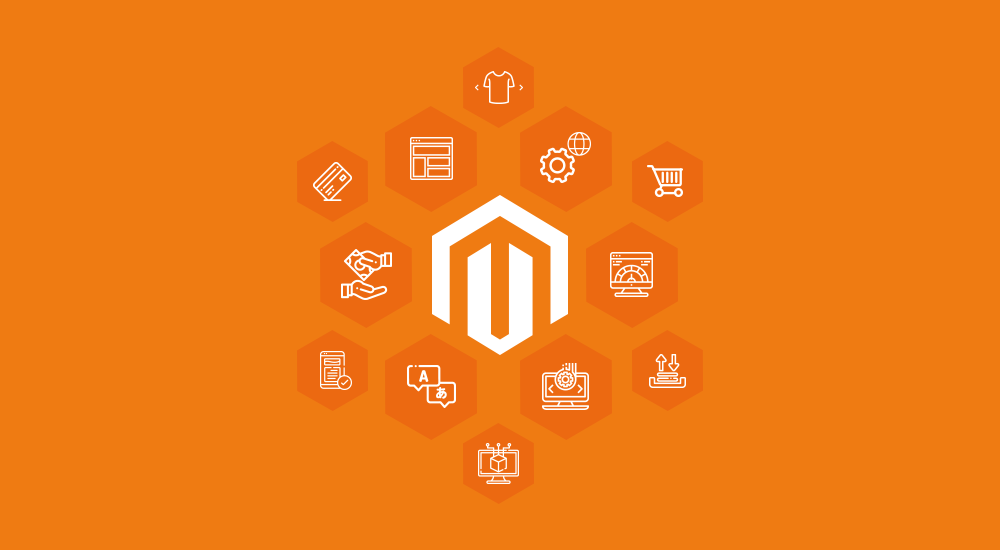The role of platforms is extremely important in creating and managing an ideal eCommerce system. To maximize the benefits of the platform and encourage long-term business growth, choosing an e-commerce platform needs to be well thought out and right. Each e-commerce model of an enterprise will have a way to choose the right platform, depending on the development goals. Moreover, Magento E-commerce platform is considered as the best platform for e-commerce systems. What makes Magento such a successful e-commerce platform? You will learn in detail about Magento E-commerce, how it works and its advantages in this article.
What is Magento?
An efficient eCommerce Website system can be created for firms using the Magento e-commerce platform. MVC patterns are used by Magento, which was built on the Zend Framework, to handle and store all data.
Magento Open Source is one component of the Magento platform (formerly known as Magento Community Edition). This is the user-friendly, free version of Magento.
Magento Commerce or the updated Magento. It offers enterprises Platform-as-a-Service hosting platforms (formerly known as Platform-as-a-Service), also known as Magento Enterprise Cloud Edition, or On-Premises on-premises solutions (previously known as Magento Enterprise Edition). Magento Commerce is a premium version with an annual minimum cost of $24,000 that is frequently utilized by big businesses.
Magento offers businesses two outdated platforms, Magento Professional Edition and Magento Go, in addition to Magento Open Source and Magento Commerce. Together with Magento Open Source and Magento Commerce, these two systems continue to operate.
Features and Functions of Magento
Now that you have a better understanding of what Magento is, let us introduce you to the main features and functions of Magento e-commerce. The following are the most interesting functions for those who are new to the platform:
- Magento Market;
- Magento Performance Toolkit;
- Manage directory;
- Order management board;
- Create coupons;
- Client’s area.
If, on the other hand, you have a deeper understanding of the system, the following features may be more useful to you:
- Advanced APIs;
- Full-page archive;
- User interface performance optimization;
- Backend performance optimization
- Integrated environment;
- Performance monitoring and testing.
Regardless of your level of experience, the following tools are require for anyone looking to build ecommerce in Magento:
- Reliability and availability;
- Magento Business Intelligence;
- Magento order management;
- Market extension.
The benefits of the Magento ecommerce platform
1. Stable Foundation
Using Magento, you appear to have everything you need to start your own online business right away. Even Open Source – the basic and free version – has the features that every business requires:
- Website administration (CMS functionality, …)
- SEO Marketing / Promotion Management
- Manage your categories.
- Order management (invoices, addresses, …)
2. There are numerous unique features that other platforms lack.
It would be an omission if we did not mention that Magento has many features that allow us to deal with multiple stores and support different locations, multi-language, and multi-currency. When comparing Magento to Shopify, Woocommerce, and Volusion, it is clear that Magento has many advantages.
3. Magento is extremely adaptable.
Magento is an open source platform, which means we can change the format and add useful features by adapting the source code to our needs and desires. Furthermore, Magento allows third-party developers to combine the source code for various purposes.
4. Superior Testability
To ensure that everything runs smoothly, you must pay close attention to every detail. When discussing Magento pros and cons, another Magento benefit is the platform’s strong testing support. This means fewer errors, happier customers, and time and money saved for you. Magento includes a Functional Testing Framework built on PHPUnit, a well-known and stable developer testing framework.
5. Platform that is self-hosted
Magento also has an advantage among self-hosted platforms: it is the most stable, as no other platform is better suited to web-based business. WooCommerce is built on WordPress, which does not support online businesses. OpenCart lacks the network and ecosystem that Magento does. Other platforms can all be described as “lacking X features,” but Magento does not. The best part is that Magento is completely free. You can do whatever you want with it.
6. It is mobile-friendly
The most frequently mentioned advantage when discussing the pros and cons of Magento is that it is mobile-friendly. A mobile-friendly configuration is an essential component of any eCommerce site in this day and age.
Being mobile-friendly is a valid requirement for running a successful internet business. A quarter of online customers require a mobile-friendly business-on-website platform. Online retailers cannot ignore the fact that “surfing the web” has gradually turned to “smartphone surfing”.
CONCLUSION
In a nutshell, we have introduced you to the Magento E-commerce platform, how it works, its features and some of its benefits in this article. If you want to learn more about magento ecommerce, this is the right place.
With the most expert and precise process, ONEXTDIGITAL is delighted to assist and implement Magento projects for enterprises. We have you covered whether you’re just getting started with Magento, moving from another platform, or require continuing assistance to improve your current website.
>>Read also
10 Outstanding Features Of Porto Magento 2 Theme – Update 2023







